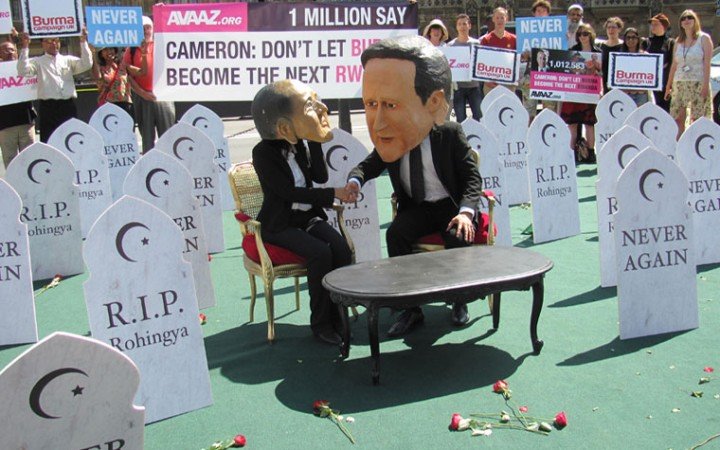Myanmar President Thein Sein’s first official visit to the UK prompted pressure from international bodies calling for him to address human rights issues in his country.
 During his visit on Monday with British Prime Minister David Cameron, protesters staged a demonstration outside Downing Street with ‘R.I.P Rohingya’ written on a mock cemetery of gravestones as a call to protect the Muslim ethnic minority.
During his visit on Monday with British Prime Minister David Cameron, protesters staged a demonstration outside Downing Street with ‘R.I.P Rohingya’ written on a mock cemetery of gravestones as a call to protect the Muslim ethnic minority.
Refugees International stated that pledges made by Thein Sein to prevent further abuse against ethnic minorities are still unfulfilled, as humanitarian access remains restricted in conflict areas.
“President Thein Sein has made several public statements about his supposed commitment to assisting the Rohingya community, but we have yet to see any real actions,” said Refugees International Senior Advocate Melanie Teff.
Last year, violence between radical Buddhists and Muslims in western Rakhine State led to about 200 people killed and some 140,000 displaced.
Despite ceasefire agreements, other ethnic minorities such as those in Kachin and Karen states are suffering from decades of armed conflict against the Myanmar army. At least 400,000 people have been driven from their homes to escape bloodshed, said Human Rights Watch in a statement released on the same day as the Myanmar President’s arrival in London.
But addressing an audience in the English capital, Thein Sein spoke with assurance. "Very possibly over the coming weeks we will have a nationwide ceasefire and the guns will go silent everywhere in Myanmar for the very first time in over 60 years," he said.
The Myanmar leader, a former military general, also promised the release of all political prisoners by the end of 2013 as the country continues its path of economic and democratic reforms. NGOs say that around 200 political dissidents are still detained.
"By the end of the year there will be no prisoners of conscience in Myanmar," he vowed.
During talks, David Cameron vocalized his concerns about the treatment of ethnic minorities and urged Thein Sein to defend human rights.
Cameron also spoke of closer military cooperation between the two countries to help resolve ethnic conflict in Myanmar.
"We believe there are many areas for Britain and your country to cooperate together, diplomatically, in terms of trade and investment, the aid and development relationship, and also our growing links in terms of our militaries," he said.
Britain’s Daily Telegraph reported that the UK will set up a “defence attaché” in Yangon to offer military training and advice in helping Myanmar put an end to civil wars that have lasted for decades.
Senior Foreign Office Minister Hugo Swire told The Daily Telegraph: "We don't underestimate how much needs to be done in Burma [Myanmar] but it is critical we are engaged in helping the Burmese undertake changes."
He added: "The right way to proceed is to have the Burmese here and to send our officials over there to help them through their difficulties."
However the Karen Community Association UK (KCA UK) is convinced that the only way for peace to prevail is for a withdrawal of Myanmar government forces from ethnic areas.
Chairman of KCA UK Htoo Ku Hsa Say said, “As someone who has had to run for my life from the Burmese Army, I can tell Cameron he is wrong to think a few sessions in a classroom will stop the Burmese Army committing abuses. Human rights abuses are not committed by a few rogue soldiers, they are government policy.”
President Thein Sein has one more day in the UK before travelling to France for continued talks.



